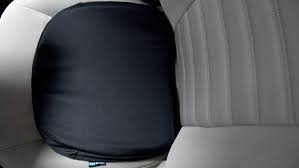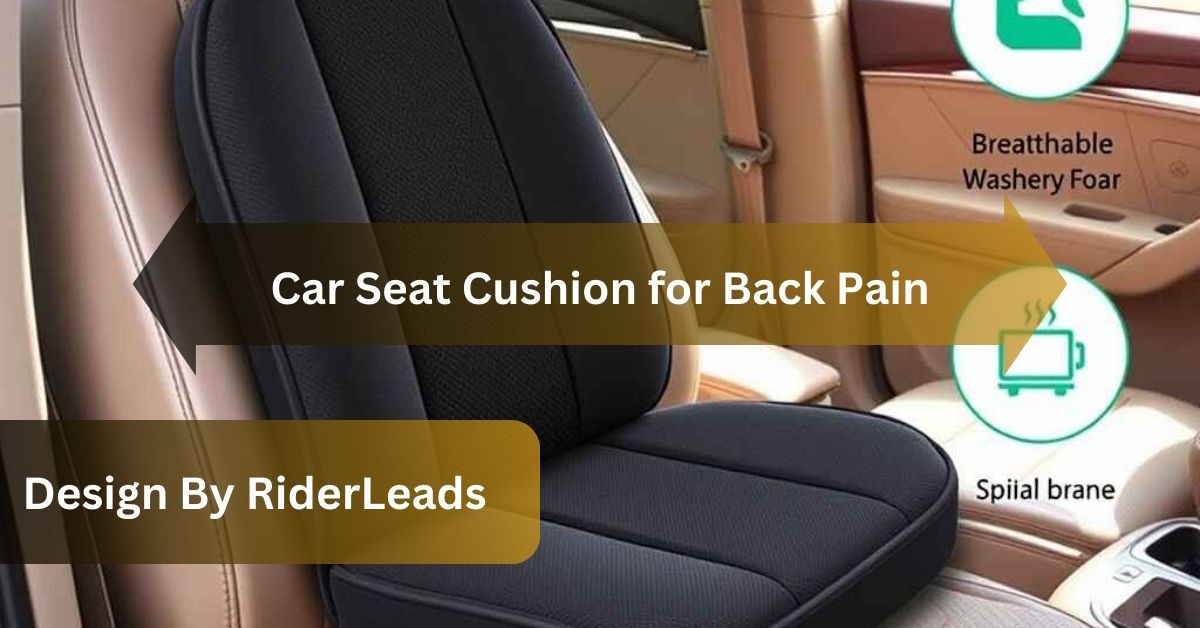If back pain is a frequent companion during your car rides, you’re not alone. Many drivers experience discomfort due to poorly designed car seats or extended periods of sitting. Luckily, a car seat cushion tailored for back pain can significantly improve your driving experience. In this detailed guide, we’ll discuss everything from the causes of back pain to choosing and maintaining the best car seat cushion for your needs.
The Link Between Driving and Back Pain:

Driving places unique demands on the body. Sitting in a fixed position for long periods can compress spinal discs and strain muscles. Here’s why driving often leads to back pain:
Prolonged Sitting:
Sitting for long periods during drives reduces blood flow, compresses spinal discs, and causes muscles to become stiff. Over time, this can lead to chronic discomfort, lower back pain, and even long-term spinal health issues. Prolonged sitting also weakens muscles, making it harder to maintain proper posture while driving.
Poor Lumbar Support:
Most car seats are not designed with proper lumbar support, which is critical for maintaining the natural curve of the lower back. Without this support, drivers may slouch, placing unnecessary strain on the lower spine and muscles. Over time, this lack of support can lead to chronic back pain.
Vibration and Road Bumps:
Constant road vibrations and sudden jolts from bumps can worsen back pain over time. These movements put pressure on the spinal discs and surrounding muscles, causing discomfort. For long-distance drivers, the continuous exposure to these vibrations can lead to increased fatigue and cumulative strain on the back.
Unnatural Posture:
Driving often requires adjusting your body to reach the steering wheel, pedals, or mirrors, which can lead to awkward sitting positions. These misalignments strain the spine, neck, and shoulders. Over time, this unnatural posture contributes to chronic pain, muscle fatigue, and poor overall spinal alignment.
Static Muscle Fatigue:
Prolonged sitting leads to static muscle fatigue, where certain muscle groups, like those in the lower back and hips, remain in a fixed position for too long. This inactivity weakens the muscles, reducing spinal support and making them more susceptible to discomfort and injury during extended drives.
Reduced Core Engagement:
While driving, the core muscles stay inactive, which compromises spinal stability and alignment. This lack of core engagement shifts the burden onto the lower back and surrounding muscles. Over time, this can exacerbate pain, reduce posture quality, and increase the likelihood of long-term spinal health problems.
A quality car seat cushion can address these issues by providing proper alignment, support, and cushioning for your back.
Benefits of Using a Car Seat Cushion:
A car seat cushion isn’t just about comfort; it’s about health and well-being. Here are some key benefits:
Alleviates Pain:
A quality car seat cushion reduces pressure on the lower back, tailbone, and hips, providing much-needed relief from discomfort. It’s especially beneficial for individuals suffering from conditions like sciatica, herniated discs, or coccyx pain. By evenly distributing weight, the cushion helps eliminate pressure points, easing pain during long drives.
Improves Posture:
A car seat cushion encourages proper spinal alignment, supporting the natural curve of your back. This reduces the strain on muscles, ligaments, and joints caused by slouching. Over time, improved posture not only alleviates back pain but also enhances overall comfort, promoting better sitting habits even outside the car.
Enhances Comfort:
Driving on hard or uneven car seats can cause discomfort, especially during long trips. A well-designed cushion adds an extra layer of padding, transforming your seat into a comfortable surface. It absorbs vibrations, softens bumps, and ensures a pleasant driving experience, making even the longest journeys more enjoyable.
Increases Driving Safety:
Pain and discomfort while driving can be distracting, reducing your focus on the road. A car seat cushion eliminates this distraction by providing consistent comfort. A more relaxed and pain-free driver can concentrate better, reducing the likelihood of accidents and ensuring a safer driving experience for everyone.
Versatility:
Car seat cushions are not just for cars—they’re incredibly versatile. Many are portable and can be used on office chairs, airplane seats, or even wheelchairs. Their adaptability ensures comfort and support wherever you sit, making them a great investment for maintaining good posture in various settings.
Prevents Long-Term Issues:
Consistently using a car seat cushion can prevent the development of chronic pain and other spinal problems. By supporting the back and promoting proper posture, these cushions help reduce the long-term effects of prolonged sitting. They contribute to better spinal health and reduce the risk of muscle fatigue over time.
Types of Car Seat Cushions:
There are various types of car seat cushions designed to address specific issues:
1. Lumbar Support Cushions:
Designed to support the natural curve of the lower back, these cushions alleviate pain and improve posture, making them perfect for drivers dealing with chronic lower back discomfort or slouching issues. They help maintain spinal alignment for more comfortable and safer driving.
2. Orthopedic Cushions:
With a contoured design, these cushions offer targeted support to relieve pressure and pain, especially for individuals suffering from sciatica, herniated discs, or other medical conditions requiring specialized back care. They provide long-lasting relief and promote healthy posture during long drives.
3. Coccyx Cushions:
Featuring a U-shaped cutout, coccyx cushions reduce pressure on the tailbone, offering relief to individuals with coccyx injuries, pain, or sensitivity while ensuring a comfortable driving experience. These cushions also help prevent worsening of existing tailbone pain from prolonged sitting.
4. Gel-Infused Cushions:
These cushions combine memory foam with cooling gel, regulating temperature to prevent overheating, making them an excellent choice for long trips in warm weather. The gel helps distribute weight evenly, ensuring a comfortable and cool seating experience.
5. Wedge Cushions:
Wedge cushions slightly elevate the hips, promoting better spinal alignment and improved posture. They’re especially useful for drivers who feel their car seats are too low. This design can reduce strain on the lower back and improve overall sitting comfort.
6. Full-Body Cushions:
Providing comprehensive support for the back, hips, and thighs, full-body cushions are ideal for long-distance drivers or individuals with multiple pain points, ensuring comfort throughout extended drives. They also help distribute pressure evenly across the body to prevent discomfort.
Key Features to Consider
Choosing the right car seat cushion requires attention to detail. Here’s what to look for:
1. Material:
Car seat cushions come in different materials, each with unique benefits. Memory foam molds to your body for personalized support, while gel layers provide cooling comfort. High-density foam offers firm support and durability, making it ideal for long-term use and consistent comfort.
2. Ergonomic Design:
An ergonomic cushion design supports the natural curve of your spine, helping to maintain proper posture and prevent slouching, which can reduce back pain and muscle strain during extended sitting periods.
3. Non-Slip Base:
A non-slip base ensures that the cushion stays securely in place while driving, preventing it from sliding around, which helps maintain consistent support and comfort throughout the journey.
4. Washable Cover:
Many car seat cushions come with removable and machine-washable covers, making it easy to keep them clean and fresh. Regular cleaning ensures hygiene and prolongs the cushion’s lifespan.
5. Breathability:
Cushions made with breathable materials help prevent overheating and reduce sweating, keeping you comfortable even during long drives or hot weather. This feature is especially important for warm climates.
6. Portability:
Lightweight and compact, portable cushions can be easily moved between your car, office chair, or home seating, providing continuous support wherever you need it and ensuring comfort throughout the day.
How to Choose the Right Cushion for Your Needs?

Choosing the right car seat cushion depends on what type of pain you’re dealing with. If you have back pain or poor posture, a lumbar support cushion helps keep your spine in the right position. For conditions like sciatica or herniated discs, an orthopedic cushion offers targeted relief.
If your tailbone hurts, a coccyx cushion with a U-shaped cutout can take pressure off that area. Memory foam cushions mold to your body for extra comfort, while gel-infused cushions keep you cool during long trips. Wedge cushions help lift your hips if your car seat is too low. Full-body cushions are best for long drives, offering support for your back, hips, and thighs. Make sure to choose a cushion that feels comfortable and fits your car properly for the best results.
Tips for Using Your Car Seat Cushion:
- Position It Properly: Place the cushion on your seat and adjust it for optimal support.
- Pair with a Lumbar Cushion: If needed, add a lumbar cushion for additional back support.
- Adjust Your Car Seat: Ensure your seat’s height and angle work in harmony with the cushion.
- Take Breaks: Even with a cushion, pause during long drives to stretch and move around.
Maintenance and Care:
To keep your cushion in top shape, follow these tips:
- Clean Regularly: Remove and wash the cover according to the manufacturer’s instructions.
- Avoid Direct Sunlight: Prolonged exposure can damage the cushion’s material.
- Store Properly: When not in use, store your cushion in a cool, dry place.
Frequently Asked Questions:
1. Can a car seat cushion eliminate back pain entirely?
While it can greatly reduce discomfort, it may not completely eliminate back pain caused by underlying medical conditions.
2. Are all car seat cushions the same size?
No, they come in various sizes. Check the dimensions to ensure a good fit for your car seat.
3. How long does a car seat cushion last?
A high-quality cushion typically lasts 2–3 years, depending on usage and care.
4. Can I use the cushion on an airplane?
Yes, most cushions are portable and suitable for use on airplanes, office chairs, or other seats.
5. Do car seat cushions work for tall or short drivers?
Yes, cushions like wedge designs can help short drivers with visibility, while others provide support for taller drivers.
Conclusion:
A car seat cushion for back pain is an invaluable tool for anyone who spends long hours driving. By providing proper support and promoting good posture, it can significantly reduce discomfort and improve your overall driving experience. With various options available, you can find a cushion that meets your specific needs and budget.
Don’t let back pain ruin your drives—invest in a car seat cushion today and enjoy the journey, pain-free!











